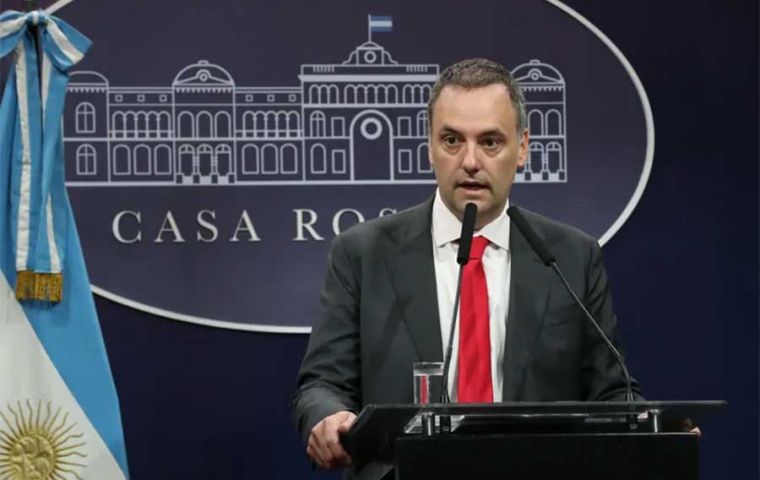MercoPress. South Atlantic News Agency
Milei taking bold measures regarding intelligence
 Presidential Spokesman Manuel Adorni
Presidential Spokesman Manuel Adorni Argentina's Libertarian regime of President Javier announced it would be dissolving the Federal Intelligence Agency (AFI) and reinstating the State's Intelligence Secretariat (SIDE) which will comprise four departments, all of them reporting directly to the head of state, the Office of the President (OPRA) posted on social media.
The SIDE would have the same headquarters and logo as it did before it was reshaped under Kirchnerism. It will now focus on Defense, Internal Security, and Technology through the Argentine Intelligence Service, the National Security Agency, and the Cybersecurity Agency, all of which would be under the newly-created Internal Affairs Division.
”President Javier Milei has ordered the dissolution of the Federal Intelligence Agency (AFI) based on the results obtained in the framework of the agency's intervention that took place last December 12, 2023. In its place, the governing body of the National Intelligence System (SIN) will be a Secretariat of State,“ OPRA's statement read.
”The denaturalization of the role of the intelligence agency for decades was total; far from putting its resources at the service of the protection of the Argentine people, the agency was used for spurious activities such as internal espionage, influence peddling, and political and ideological persecution,“ it went on.
”Thus, the creation of the State's Intelligence Secretariat (SIDE), directly under the President of the Nation, which will have operational control of four agencies created with the purpose of transforming and modernizing the intelligence system, promoting excellence and professionalism in the development of its tasks, is provided for. The SIDE will be in charge of Secretary Sergio Neiffert,“ it was announced. Last month Neiffert replaced Silvestre Sívori as AFI chief.
”The Argentine Intelligence Service (SIA) will have among its functions the collection of strategic information around the world, as well as the cooperation with allied intelligence agencies for the prevention and deterrence of threats to our country. The SIA will be headed by Director Lic. Alejandro Walter Colombo,“ OPRA also noted.
”The National Security Agency (ASN) will be in charge of providing early warning and generating information on complex federal crimes within the national territory, as well as monitoring coordinated threats from criminal and terrorist organizations. The Director of the ASN will be [Retired Police] General Alejandro Pablo Cecati.“
”The Federal Cybersecurity Agency (AFC) will evaluate, plan, and develop solutions for the detection and containment of cyber-attacks against critical IT infrastructure in the country, as well as training of the State's human capital for the prevention of threats and security breaches. The Director of the AFC will be Dr. Ariel Waissbein,“ the Argentine Government also mentioned.
”The Internal Affairs Division (DAI) will supervise and audit the management of the resources of the agencies operating under the orbit of the SIDE, and will ensure legal and institutional respect in the exercise of its powers,“ it was also explained.
”In turn, the SIDE, as the governing body of the National Intelligence System, will be in charge of the operational coordination and budgetary control of the National Directorate of Criminal Intelligence (DNIC) and the National Directorate of Strategic Military Intelligence (DNIEM), which depend on the Ministry of Security and the Ministry of Defense respectively,“ OPRA further elaborated.
”This set of modifications on the structure of the National Intelligence System will allow the consolidation of a strategic and modern vision, and will guarantee the balance between the different agencies, keeping away any personal, partisan or contrary interest to the enhancement of the Homeland,“ the statement ended.
In addition to these changes regarding intelligence matters, Milei's Government also plans to limit access to Cada Rosada press conferences. ”We are going to make an elite press room“ for ”journalists who can prove that they deserve to be close to the President of the Nation,“ Presidential Spokesman Manuel Adorni said in a TV interview aired during the weekend.
”We are working on a new resolution: we are going to make it a privilege to be in the conference room of the Casa Rosada and a privilege to be an accredited media in the Casa Rosada,“ Adorni said while insisting that the main criterion for accepting accreditation requests would be ”excellence“ regarding the reporters' experience and the outlet's scope. ”We will try to make them proud to have access to the conference room,“ he insisted.
Adorni claimed it was Milei's right not to admit any given reporter by name because ”we do not tolerate lies, especially from a journalist who today lies about one thing and tomorrow may lie to you about much more serious and sensitive issues that may even put Argentina at risk.“
”We will never tolerate lies, whoever they come from. You can make mistakes, what you cannot do is to tell a lie to harm,“ the official went on. Adorni also claimed that the proposed criteria were similar to those requested by the White House.
On June 27 the Milei administration had to go back on its steps when it launched the idea to reimpose the mandatory licensing of journalists, a practice that would have brought back memories of de facto governments. Argentina's Supreme Court has already ruled in 1985 that such an initiative would clash with the constitutional right to free expression.
Milei has repeatedly badmouthed newspeople, calling them ”slanderers,“ ”imbeciles,“ and ”enveloped” (meaning they were taking bribes to trim the news to fit someone's interests).
The Inter-American Press Association (IAPA) expressed its concern over these attacks and called for “tolerance.” On June 7, the Association of Argentine Journalistic Entities (Adepa) warned: “Showing facts is not insulting. To criticize is not to attack. To question is not to attack. To discuss is not to harass. Informing and expressing opinions does not turn anyone into an enemy or a mercenary.”
With all these measures, what shall it be? Free speech or obscurity? Time will tell.





Top Comments
Disclaimer & comment rulesCommenting for this story is now closed.
If you have a Facebook account, become a fan and comment on our Facebook Page!